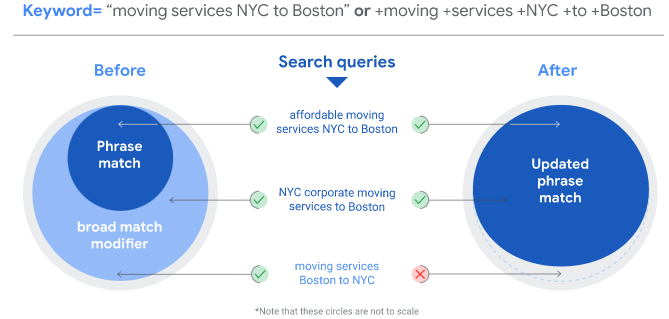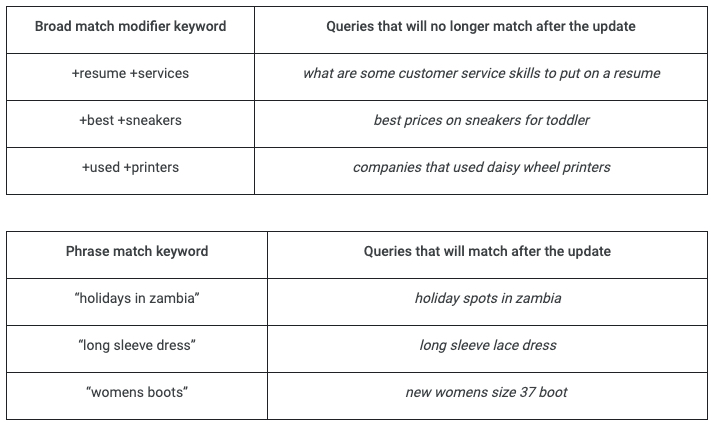Starting in February 2021, Google is once again changing how some of its keyword match types operate. As a reminder, Google’s keyword match types help control which searches can trigger an advertiser’s ad.
The current changes include phrase match, broad match modifier (BMM) and improvements to regular broad match. Phrase match will expand to include some broad match modifier traffic and the current broad match modifier functionality will no longer be supported.
The good news is that this does not require advertisers to make any changes to their current campaigns. Advertisers can continue to leverage their current phrase match or broad match modifier keywords. BMM keywords will continue to work using the new phrase matching behavior.
The performance of all match types should however, be monitored closely.
Here is Google’s example of how this will work:


How will phrase match type change?
Phrase match will take on the functionality of broad match modifier but will be smarter. Google uses moving-related keywords to illustrate how this will work. Currently, the BMM keyword, +moving +services +NYC +to +Boston may show up for the search query “moving services NYC to Boston” or any search that contains the keywords with plus signs or broad versions of those keywords–in any order.
Since matching out to any order of keywords was previously possible, the cities may reverse in the example keyword in order to serve for the search, “moving services Boston to NYC.” With the new phrase match type, however, the order of the keywords is taken into account. The new phrase match type will keep the phrase, “NYC to Boston” in mind and not show for searches for “Boston to NYC.” The new phrase match will consider the word order when relevant to the meaning.
What to expect with phrase match traffic:
- For your phrase keywords, it is likely we will see an increase in traffic volumes overall
- Since keyword order or phrases like “NYC to Boston” will be kept in mind it is essential to build out additional, relevant phrase keywords and review search terms reports.
What will happen with broad match modifier?
During the transition, advertisers can create BMM keywords with plus signs that will operate as the new phrase match. BMM keywords will behave the same as the updated phrase match using the quotation marks around the keyword. With that said, we recommend only creating phrase match keywords moving forward. However, in July 2021, it will no longer be possible to create new broad match modifier keywords.
What to expect with broad match modifier traffic:
- There may be a decrease in traffic volumes for BMM
- Broad match modifiers will no longer operate on a word within the keyword. If you use a keyword such as +moving services, the modifier will now apply to both words, similar to +moving +services or “moving services.”
Broad match will also have some changes:
In addition to the phrase match change and sunset of BMM, Broad match will have an update. Regular broad match will look at signals like landing pages and keywords in your ad group to deliver more relevant searches. However, as usual, while leveraging regular board match, it should be closely monitored, and negatives should be applied to campaigns or ad groups to avoid matching too far from those that are intended.
How will performance be impacted?
Similar to past match type behavior changes, keyword matching has become less straightforward. Advertisers have lost some control over the keywords their ads will serve for and this is no different with the February 2021 update.
At a glance, this may save advertisers some time in account management with one less match type to manage. However, as long-time search professionals, it is our assessment that performance is sure to be affected. Fluctuations in traffic may occur for different match types and overall as this change takes effect. During this time, it is crucial to review performance by match type and search terms reports in order to add any relevant variations as well as pause keywords or negate any phrases that are deemed irrelevant.
Bottom Line on the Match Type Change
As we’ve seen over the years, Google continues to automate and streamline account management by way of match types, different ad formats, smart bidding, interface redesign, reporting, etc. Automation also continues to be refined with features like Dynamic Search Ads and Smart Bidding. These features are becoming more sophisticated and even more controlled than they once were. We continue to expect more automation in the future as Google continues to streamline Google Search Ads account management.
With that said, while this change is consolidating the functionality of match types in an attempt at face value to make it easier for advertisers to manage their search accounts, it will take time to evaluate and understand how performance and keyword matching are affected.





